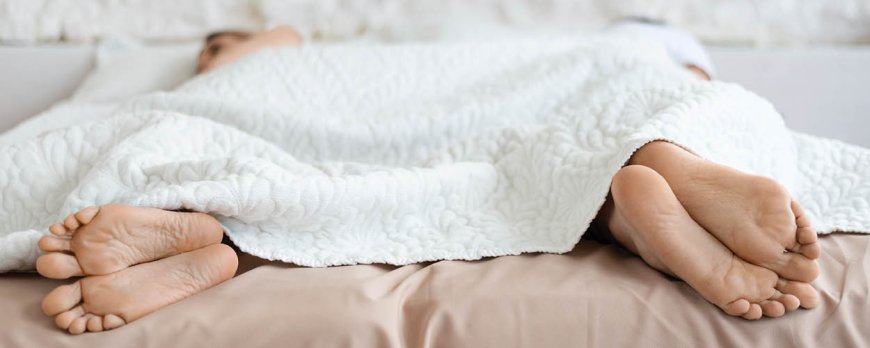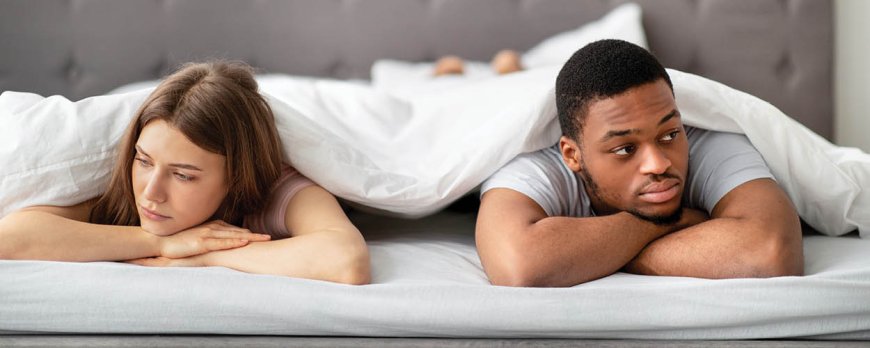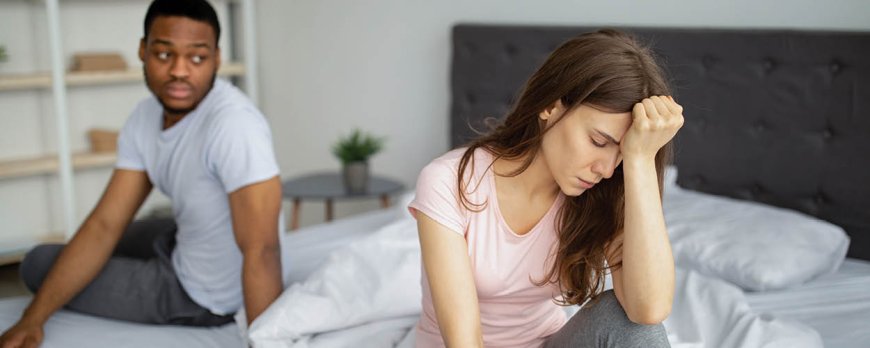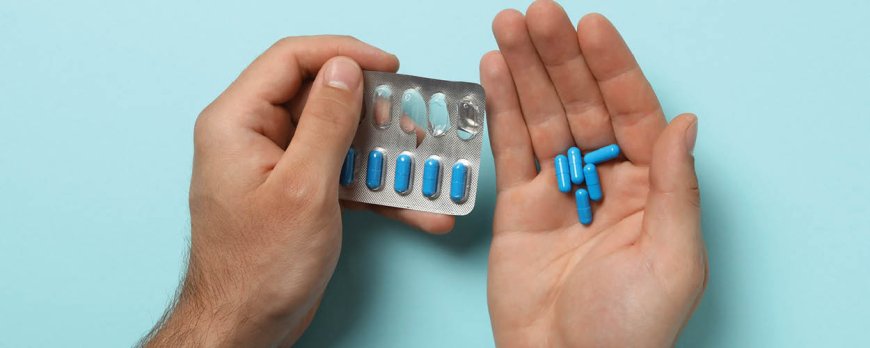What is libido caused by?
Explore the answer to 'What is libido caused by?' Understand the various biological, psychological, and social factors influencing your sexual desire.

What is libido caused by?
Libido, or sex drive, can be influenced by a variety of factors. Both men and women may experience low libido due to physical, psychological, and social factors. Understanding the causes of low libido can help individuals address and manage this issue effectively.
Key Takeaways:
- Low libido in men can be caused by physical factors like weight gain, diabetes, and high blood pressure.
- Psychological factors, such as stress and relationship issues, can contribute to low libido in both men and women.
- Medications, alcohol and drug use, and pornography can affect libido in men.
- For women, low libido can be influenced by life stressors, fatigue, hormonal changes during menopause, and previous trauma.
- Lifestyle changes such as regular exercise, stress reduction, and quitting unhealthy habits can help improve libido.
- Seeking professional help from healthcare providers specializing in sexual health may be beneficial for individuals experiencing low libido.
By understanding the various factors that can impact libido, individuals can take proactive steps to improve their sexual desire and overall well-being.
Biological factors affecting libido
Hormonal imbalances and age can play a significant role in influencing libido. For men, imbalances in testosterone levels can lead to a decrease in sexual desire. Testosterone is a key hormone responsible for regulating libido in both men and women. As men age, their testosterone levels naturally decline, which can impact their sex drive. Additionally, certain medical conditions such as diabetes, high blood pressure, and endocrine disorders can also contribute to hormonal imbalances and affect libido.
In women, hormonal changes during menopause can have a similar effect on libido. Estrogen and progesterone levels decrease, which can result in a decrease in sexual desire. Hormonal imbalances in women can also be caused by conditions such as polycystic ovary syndrome (PCOS) or thyroid disorders. These imbalances can have a negative impact on libido and overall sexual satisfaction.
Hormonal imbalances and libido:
- Low testosterone levels in men
- Decreased estrogen and progesterone levels in women during menopause
- Medical conditions such as diabetes, high blood pressure, endocrine disorders, PCOS, and thyroid disorders
Age and libido:
- Natural decline in testosterone levels in men as they age
- Hormonal changes during menopause in women
It's important to note that while hormonal imbalances and age can have an impact on libido, they are not the sole determinants. Psychological and social factors, medication use, stress levels, and overall lifestyle also contribute to sexual desire. Understanding and addressing these factors holistically can help individuals improve their libido and overall sexual well-being.
Disclaimer: This article is for informational purposes only and does not constitute medical advice. It is essential to consult with a healthcare professional for personalized guidance and treatment options.
Psychological Factors Affecting Libido
Emotional factors and psychological well-being can have a profound impact on libido. When it comes to sexual desire, the mind plays a crucial role. Stress, anxiety, and depression can all contribute to a decrease in libido, making it difficult to maintain a healthy sexual relationship. Understanding and addressing these psychological factors is key to improving libido.
Here are some common psychological factors that can affect libido:
- Stress: High levels of stress can cause a decrease in sexual desire. Finding effective stress management techniques, such as relaxation exercises or therapy, can help improve libido.
- Emotional Connection: Building and maintaining a strong emotional connection with your partner is important for a healthy sex life. Lack of emotional intimacy can lead to a decrease in libido.
- Relationship Issues: Conflicts or unresolved issues within a relationship can negatively impact libido. Open and honest communication, as well as couples counseling, can help address these issues and improve sexual desire.
- Psychological Well-being: Mental health conditions such as depression and anxiety can significantly affect libido. Seeking professional help and treatment for these conditions is crucial.
Addressing these psychological factors can positively impact libido and overall sexual satisfaction. It's important to prioritize emotional well-being and seek support when needed to maintain a healthy and fulfilling sex life.

Social Factors Affecting Libido
Relationship issues can impact libido and overall sexual desire. When there are unresolved conflicts or a lack of emotional connection between partners, it can lead to a decrease in sexual interest. Communication breakdown, infidelity, and feelings of resentment can all contribute to a decline in libido. In addition, stressors outside of the relationship, such as work-related pressures or financial difficulties, can also negatively affect sexual desire.
Addressing relationship issues is crucial for maintaining a healthy libido. Couples can benefit from open and honest communication, seeking therapy or counseling, and prioritizing quality time together. Building emotional intimacy and trust can help reignite desire and strengthen the sexual bond between partners.
It is important to note that individual experiences may vary, and not all relationship issues will directly impact libido. However, for those who do find their sexual desire affected by relationship difficulties, seeking professional help and working towards resolution can significantly improve overall sexual well-being.
Medications and Libido
Some medications can have a negative impact on libido and sexual desire. These medications can affect hormone levels and neurotransmitters in the brain, leading to a decrease in sexual desire and arousal. It's important to note that not all medications have this effect, and the impact can vary from person to person.
Here are some common types of medications that may affect libido:
- Antidepressants: Certain antidepressant medications, such as selective serotonin reuptake inhibitors (SSRIs), can cause sexual side effects, including a decrease in libido.
- Antihypertensives: Some blood pressure medications, such as beta blockers and diuretics, have been associated with decreased sexual desire.
- Hormonal contraceptives: Birth control pills and other hormonal contraceptives can sometimes affect libido, although the impact is not the same for everyone.
- Antipsychotics: Certain antipsychotic medications can cause sexual side effects, including decreased libido and difficulty achieving orgasm.
- Pain medications: Opioid pain medications, such as morphine and codeine, may decrease sexual desire due to their effects on the central nervous system.
If you're experiencing a decrease in libido while taking any medications, it's important to talk to your healthcare provider. They can help determine if the medication is causing the issue and explore alternatives or adjustments that may help alleviate the side effects.
Consulting with Your Healthcare Provider
It's crucial to consult with a healthcare provider specializing in sexual health if you're experiencing low libido that is affecting your overall well-being and quality of life. They can provide a thorough evaluation, taking into account your medical history, medications, and other factors that may be contributing to the issue.
Your healthcare provider may recommend lifestyle changes, such as exercise, stress reduction techniques, and healthier habits, to improve libido. They may also discuss potential treatment options, such as hormone therapy, psychotherapy, or medication adjustments to address the underlying causes of low libido.
Remember, everyone's experience with medication and libido is unique, and it's essential to work with a healthcare professional to find the best approach for your specific needs.
Stress and Libido
High levels of stress can lead to a decrease in libido and sexual desire. When the body is under stress, it produces higher levels of cortisol, which can disrupt the delicate balance of hormones involved in sexual arousal and response. Stress can also have a negative impact on mood and mental well-being, making it more difficult to feel sexually motivated or connected to a partner.
So, how can you manage stress and improve your libido?
- Practice relaxation techniques: Explore relaxation techniques such as deep breathing, meditation, or yoga to help reduce stress levels and promote a sense of calm.
- Make time for self-care: Prioritize self-care activities that bring you joy and help you unwind, such as taking a warm bath, reading a book, or engaging in hobbies.
- Communicate with your partner: Openly discuss your concerns and feelings with your partner, fostering a supportive and understanding environment that can alleviate stress and improve intimacy.
Seeking professional help
If stress continues to impact your libido and overall well-being, it may be beneficial to seek professional help. Healthcare providers specializing in sexual health can offer guidance, support, and potential treatment options to address underlying physiological or psychological factors contributing to low libido. Remember, low libido is a common concern and seeking help is a proactive step toward finding solutions and improving sexual satisfaction.

Lifestyle Factors and Libido
Making certain lifestyle changes can have a positive impact on libido and sexual desire. When it comes to boosting your sex drive, simple adjustments to your daily routine can make a big difference. Here are some key lifestyle factors that can help improve your libido:
- Regular exercise: Engaging in regular physical activity not only benefits your overall health, but it can also increase blood flow to the genital area and enhance sexual arousal. Aim for at least 30 minutes of exercise most days of the week.
- Open communication in relationships: Maintaining open and honest communication with your partner is essential for a satisfying sexual relationship. Discussing your desires, concerns, and needs can help you feel more connected and increase intimacy.
- Stress reduction: High levels of stress can take a toll on your libido. Find healthy ways to manage stress, such as practicing relaxation techniques, engaging in hobbies, or seeking support from loved ones.
- Quitting bad habits: Smoking and excessive alcohol use can negatively impact both your overall health and your sexual desire. Quitting smoking and moderating your alcohol consumption can improve your libido and enhance sexual performance.
Incorporating these lifestyle changes into your daily routine can help improve your libido and sexual satisfaction. However, it's important to remember that everyone is unique, and what works for one person may not work for another. If you're experiencing persistent low libido despite making these changes, it may be beneficial to seek professional help from healthcare providers specializing in sexual health. They can provide personalized guidance and explore any underlying factors that may be contributing to your low libido.
Women and Low Libido
Women can experience low libido due to various factors, including hormone changes, relationship issues, and psychological factors. Hormone fluctuations, such as those that occur during menopause, can lead to a decrease in sexual desire. Additionally, relationship issues, such as lack of communication or emotional disconnection, can negatively impact a woman's libido. Psychological factors such as depression, anxiety, and previous trauma can also contribute to low libido in women.
It is important to address these factors and seek solutions for low libido in women. Open and honest communication with a partner can help address relationship issues and enhance emotional connection. Seeking professional help from a healthcare provider specializing in sexual health can provide guidance and support in addressing hormonal imbalances and psychological factors.
Strategies to Improve Libido
- Regular exercise: Engaging in physical activity can improve blood flow and boost mood, which in turn can enhance libido.
- Stress reduction: Managing stress through relaxation techniques like meditation or yoga can help alleviate psychological burdens that may be affecting libido.
- Quitting bad habits: Eliminating unhealthy habits like smoking and excessive alcohol use can have a positive impact on overall well-being, including libido.
By addressing these factors and exploring lifestyle changes, women can take proactive steps towards improving their libido and overall sexual satisfaction. Remember, seeking professional help is always recommended for individuals experiencing persistent or distressing changes in libido.

Seeking Professional Help
If you are experiencing low libido, seeking professional help from healthcare providers specializing in sexual health can be beneficial. These experts have the knowledge and experience to understand the various factors that can contribute to low libido and can provide personalized guidance and treatment options to address the underlying causes.
During a professional consultation, healthcare providers will typically conduct a thorough assessment to determine the possible factors affecting your libido. They may ask about your medical history, current medications, lifestyle habits, and psychological well-being. This comprehensive evaluation helps them identify any physical, psychological, or social factors that may be contributing to your low libido.
Based on the assessment, healthcare providers can then tailor a treatment plan to address your specific needs. This may involve addressing any hormonal imbalances, recommending lifestyle changes, or suggesting therapies to improve psychological well-being. In some cases, medication or other interventions may be recommended to enhance sexual desire and improve overall sexual satisfaction.
Remember, everyone's experience with low libido is unique, and what works for one person may not work for another. Seeking professional help ensures that you receive personalized care and guidance, increasing your chances of finding a solution that works for you.
Conclusion
Understanding the various factors that can influence libido is essential in addressing any issues and maintaining a healthy sexual desire. Libido, or sex drive, can be affected by a combination of physical, psychological, and social factors.
In men, physical issues such as weight gain, diabetes, high blood pressure, and endocrine disorders can impact libido. Psychological factors, including stress, lack of emotional connection, and relationship issues, can also contribute to low libido. Additionally, medications, alcohol and drug use, as well as pornography, can affect libido in men.
For women, common causes of low libido include life stressors and fatigue, medications, weight gain, hormone changes during menopause, sexual pain or dyspareunia, relationship issues, previous trauma, and psychological factors such as depression and anxiety.
However, there are steps that can be taken to improve libido. Lifestyle changes such as regular exercise, communication in relationships, stress reduction, and quitting bad habits like smoking and excessive alcohol use can have a positive impact. It is also important to seek professional help from healthcare providers specializing in sexual health for individuals experiencing low libido.
By addressing and understanding the various factors that contribute to low libido, individuals can take control of their sexual desire and work towards a healthier and more satisfying intimate life.
FAQ
What can cause low libido in men?
Low libido in men can be caused by physical issues such as weight gain, diabetes, high blood pressure, and endocrine disorders. Psychological factors such as stress, lack of emotional connection, and relationship issues can also contribute to low libido. Medications, alcohol and drug use, and pornography can also affect libido in men.
What are common causes of low libido in women?
Common causes of low libido in women include life stressors and fatigue, medications, weight gain, hormone changes during menopause, sexual pain or dyspareunia, relationship issues, previous trauma, and psychological factors such as depression and anxiety.
What lifestyle changes can help improve libido?
Lifestyle changes such as regular exercise, communication in relationships, stress reduction, and quitting bad habits like smoking and excessive alcohol use can help improve libido.
When should I seek professional help for low libido?
If you are experiencing persistent low libido and it is affecting your quality of life and relationships, it is advisable to seek professional help from healthcare providers specializing in sexual health.


































































































































